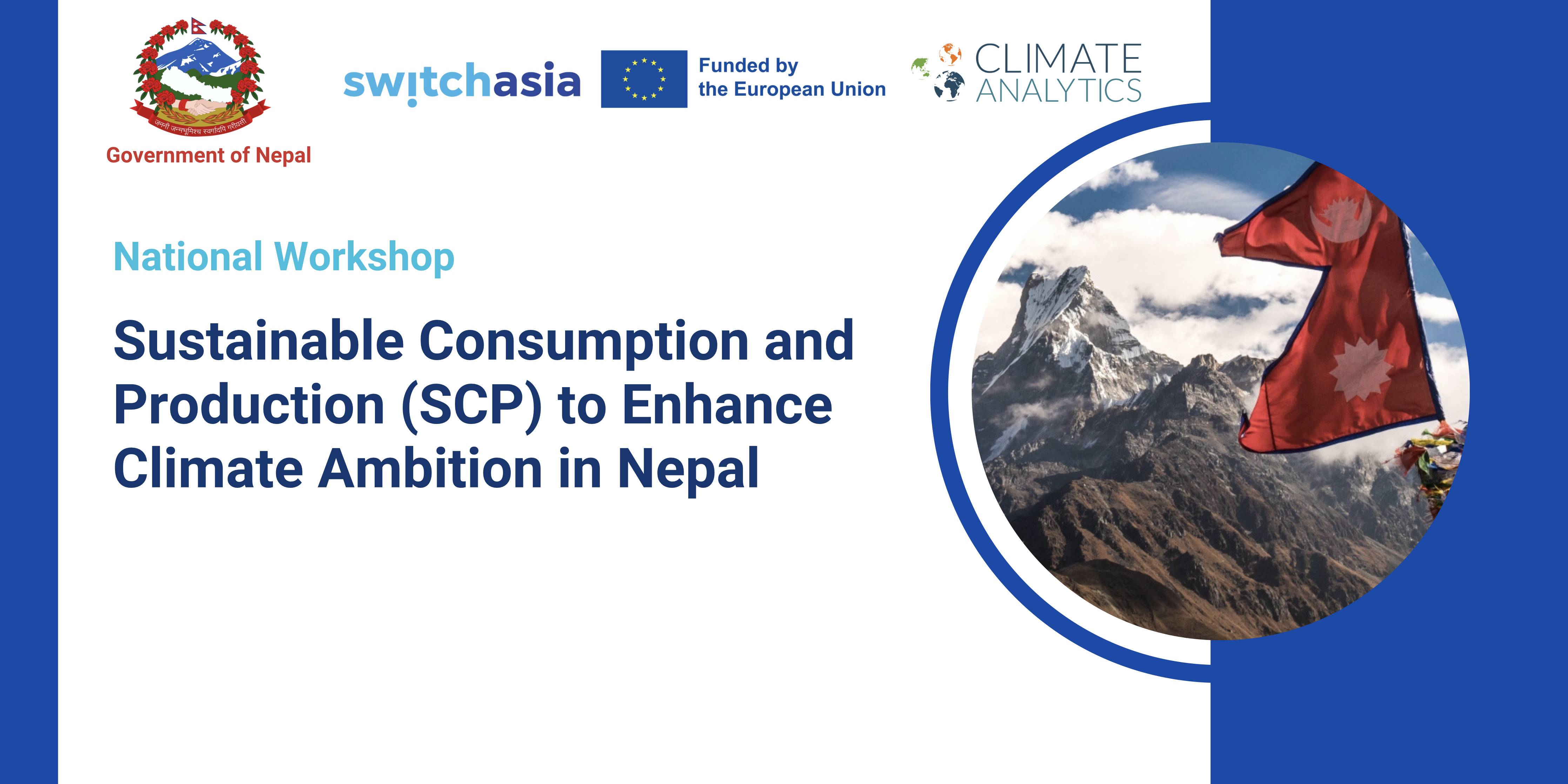
Kathmandu, Nepal – On March 14, 2024, the EU SWITCH-Asia Policy Support Component, in collaboration with the Ministry of Forests and Environment and Climate Analytics, organized the National Workshop on Sustainable Consumption and Production to Enhance Climate Ambition in Nepal. This event is part of the ongoing Technical Advisory (TA) on “Sustainable Consumption and Production (SCP)-linked Nationally Determined Contributions (NDC) - Identifying Opportunities to Capitalize Synergies” in South Asia.
The workshop brought together approximately 35 experts and participants from government, private sector, academia, and international development partners to explore opportunities for enhancing Nepal’s climate ambition through SCP and circular economy measures. The current and projected climate change scenarios have raised serious concerns globally. The recently concluded Global Stocktake (GST) process under the Paris Agreement has recognized the severe scientific warnings issued by the Intergovernmental Panel on Climate Change (IPCC) and the United Nations Environment Programme’s (UNEP) Emissions Gap Report. Nepal has consistently demonstrated its leadership and commitment to achieving the objectives of the Paris Agreement and other environmental agreements. The country has also acknowledged the importance of SCP in its development pathway, especially as it transitions out of the “Least Developed Country (LDC)” category. As a party to the Paris Agreement, the government of Nepal has submitted its NDCs and is aspiring to enhance those targets by 2025. SCP has the potential to significantly contribute to climate benefits while promoting sustainable development.
Ms. Binita Guragain, Under Secretary at the Ministry of Forests and Environment, Government of Nepal, opened the workshop by welcoming the participants and highlighting the importance of SCP in climate action and sustainable development. She also acknowledged the support of the European Union and the SWITCH-Asia Programme and stressed the importance of SCP and circular economy principles in Nepal’s development pathways.
Dr. Maheshwar Dhakal, Joint Secretary at the Ministry of Forests and Environment, Government of Nepal, emphasized the significance of SCP in addressing the triple planetary crisis in his keynote address. He reiterated that SCP must be prioritized in Nepal’s development agenda as the country aims to graduate from a Least Developed Country to a middle-income country. He also highlighted the necessity of framing national development strategies within the context of finite resources, where resource efficiency, SCP, and circular economy approaches are crucial for achieving the Sustainable Development Goals (SDGs), the objectives of the Paris Agreement, and other multilateral environmental agreements.
Mr. Ranga Pallawala, Key Expert on Climate Change and Environment at the EU SWITCH-Asia Programme, provided an overview of the linkages between climate change and SCP, highlighting recent scientific recommendations on the significance of SCP for climate ambition. He also introduced the ongoing Regional Technical Advisory (TA) on SCP-linked NDCs in the South Asia region.
Ms. Shubhuti Kiran Ghimire, Expert at the EU SWITCH-Asia Programme, presented a summary of the findings on SCP and Circular Economy in Nepal’s NDCs, including the SCP aspects highlighted in the current NDCs and areas that could further contribute to the NDCs. She also briefed participants on the stakeholder views identified during preliminary consultations.
During the panel discussion, moderated by Mr. Manjeet Dhakal, Director of South Asia at Climate Analytics, panellists offered various perspectives.
Dr. Nawa Raj Khatiwada, Senior Researcher at the Nepal Development Research Institute, highlighted the importance of adopting a whole-system approach to tackle development challenges, with markets playing a crucial role in system transformation to enhance resource efficiency and SCP.
Ms. Menila Kharel, Thematic Lead at Practical Action Nepal, noted the relevance of overall food systems to Nepal, stating that SCP in food systems could yield significant climate change co-benefits, particularly in terms of resilience building and climate change adaptation.
Mr. Suman Dhun Shreshtha, Director of the Intellectuals Centre of Nepal, emphasized the importance of extending SCP and circular economy processes to the unreported informal sector, including micro and small enterprises, which have the potential for rapid growth. Introducing SCP practices at an early stage could have a more significant impact in the future.
Mr. Raju Sapkota from the Climate Change Management Division of the Ministry of Forests and Environment noted that this initiative is timely, as Nepal is looking to begin updating its NDCs as a party to the Paris Agreement. He mentioned that the analysis and stakeholder views on the importance of SCP and Circular Economy would enhance Nepal’s climate ambition.
Mr. Sanjay Vashist, Senior Expert at the EU SWITCH-Asia Programme, delivered the closing remarks, highlighting the next steps, including potential areas for further discussions with stakeholders in integrating SCP into Nepal’s climate ambition, leading up to the next NDC enhancement due in 2025.
For more information contact:
Ranga Pallawala, Climate Change and Environment Policy Expert
SWITCH-Asia Policy Support Component
Learn more here.


